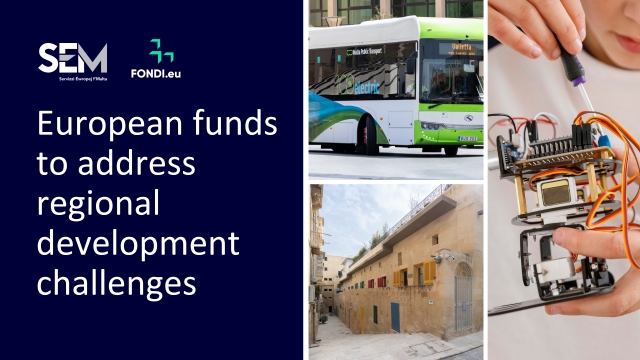
Tista’ taqra bil-
Malti.
The EU’s Cohesion Policy supports initiatives and projects in the different regions of EU Member States to reduce the economic, social and territorial differences between them, while maintaining their identity. In this way, it would enable the regions in the EU, of which there are over 240, to reach their full potential, while improving the living standards and prosperity of those who live in them.
To achieve these goals, the EU not only has clear targets, but also funding programmes that put this cohesion into practice. Through the funding programme titled Interreg Europe, the EU supports projects of cooperation across different regions to jointly tackle common challenges and find shared solutions in fields such as health, the environment, research, education, transport and sustainable energy.
The programme Interreg Europe is co-funded by the European Regional Development Fund (ERDF), with €379 million allocated for the new 2021-2027 programming period. This financial assistance encourages European regions of 29 countries (EU27, Norway and Switzerland) to to share best practices and learn from each other about what works best.
Through such projects, regional and local public authorities across Europe can come together to share ideas and experience on public policy in practice, therefore improving strategies for their citizens and communities.
Interreg Europe is therefore mainly open to local, regional, and national public entities, but also entities such as research institutes and non-governmental organisations.
During the previous funding programme for 2014-2020, 258 projects were selected for funding, 17 of which included Maltese partners (about 7%). Such approved projects may be accessed here.
A first example of a project financed under this programme is the Design4Innovation project – a collaboration between eight European partners to promote design as a tool for user-centred innovation. The project managed to mobilise over €13.6m of new investment in design which directly benefitted over 620 small businesses and many more indirectly. Among other initiatives, the project has managed to influence the creation of the Valletta Design Cluster – a community space for cultural and creative practice, by taking a user-centred approach locally and learn from similar experience in other regions.
Another example is eBussed – a project supporting the uptake of e-buses in new regions and supports the expansion of existing e-fleets. This project allowed Malta to learn from other partners, who shared the realities and difficulties associated with the large-scale introduction of fully powered electric buses. These were taken into consideration in the development of a project Action Plan for Gozo which involved the updating of the Gozo Regional Development Strategy 2021–2030 and the initiation of the e-bus transition in Gozo.
The new 2021-2027 programme covers six topics contributing to all EU priorities, these being a smarter Europe, a Greener Europe, a more connected Europe, a more social Europe, Europe closer to citizens, and better regional governance. More information on these priorities may be accessed here.
For Malta, under the first call for project proposals of this new programme, two projects have been approved for EU funding.
Notably, the second call for interregional cooperation projects is now open until June 9, 2023, at midday. The terms of reference, programme manual and application form may be accessed here.
For more information on this EU funding programme or any other, please send an email with your queries or call us on 2779 7300.
content supplied by Servizzi Ewropej f’Malta (SEM)








